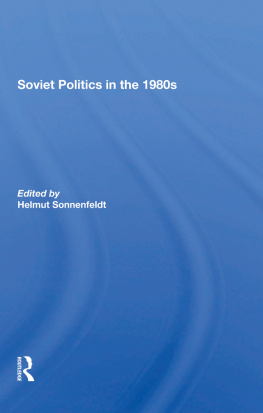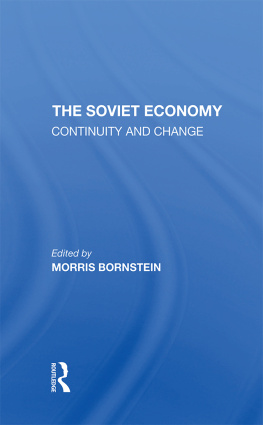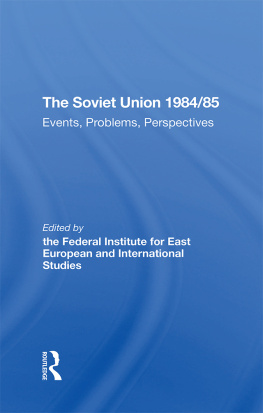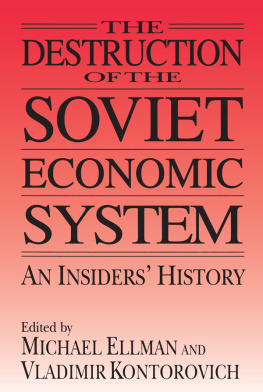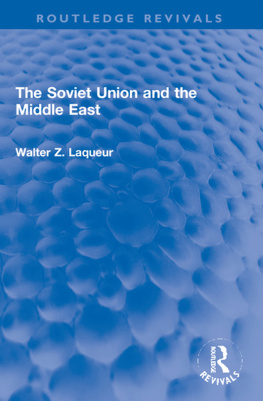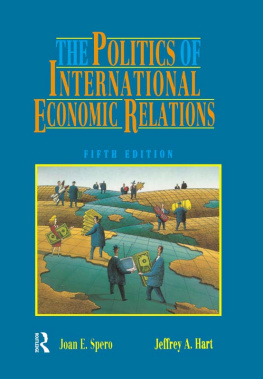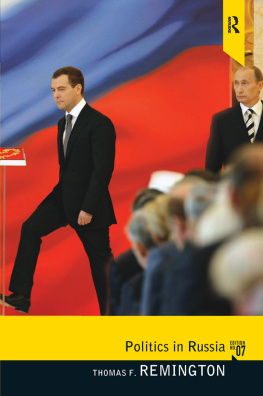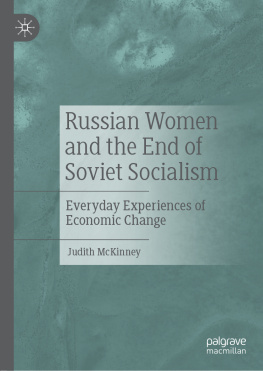Economics and Politics in the USSR
About the Book and Editors
Soviet scholars have apparently stayed clear of meaningful analysis of such touchy subjects as interdependence and conflict in the relationship between economics and politics. Very little has been published on this issueno surprise in a system that controls centrally both politics and the economy, with an emphasis on rapid economic development.
The absence of meaningful Soviet research led the Federal Institute for East European and International Studies in Cologne to sponsor an international interdisciplinary conference on the subject. Contributions to the resulting book cover three main areas. The first includes the impact of traditional Russian political culture on contemporary Soviet economic thinking and behavior, the rank of economic aims in the priority system of Soviet politics, and the function of economic institutions in the implementation of political aims. The second concerns the role of political lobbies in the economy and repercussions of economic change for Soviet politics. Foreign economic relations and the USSR's foreign policy make up the third area. The concluding discussion reviews the state of international research and identifies areas for future study.
Dr. Hans-Hermann Hohmann is senior economist at the Federal Institute for East European and International Studies in Cologne. Dr. Alec Nove is professor emeritus of economics at the University of Glasgow. Dr. Heinrich Vogel is the director of the Federal Institute for East European and International Studies.
Published in cooperation with das Bundesinstitut fr ostwissenschaftliche und internationale Studien/the Federal Institute for East European and International Studies
Economics and Politics in the USSR
Problems of Interdependence
edited by Hans-Hermann Hhmann, Alec Nove, and Heinrich Vogel
First published 1986 by Westview Press, Inc.
Published 2018 by Routledge
52 Vanderbilt Avenue, New York, NY 10017
2 Park Square, Milton Park, Abingdon, Oxon OX14 4RN
Routledge is an imprint of the Taylor & Francis Group, an informa business
Copyright 1986 Taylor & Francis
All rights reserved. No part of this book may be reprinted or reproduced or utilised in any form or by any electronic, mechanical, or other means, now known or hereafter invented, including photocopying and recording, or in any information storage or retrieval system, without permission in writing from the publishers.
Notice:
Product or corporate names may be trademarks or registered trademarks, and are used only for identification and explanation without intent to infringe.
Library of Congress Cataloging-in-Publication Data
Economics and politics in the USSR.
1. Soviet UnionEconomic policy1976
Addresses, essays, lectures. 2. Soviet UnionPolitics
and government1953 Addresses, essays, lectures.
I. Hhmann, Hans-Hermann. II. Nove, Alec.
III. Vogel, Heinrich, 1937 .
HC336.25.E28 1986 338.947 86-1534
ISBN 13: 978-0-367-00649-5 (hbk)
Contents
, Alec Nove
, Helmut Dahm
, Hans-Hermann Hohmann
, Georg Brunner
, Peter Frank
, Christopher Davis
, Ronald Amann
, Hans-Jurgen Wagener
, Gregory Grossman
, Peter Wiles
Klaus von Beyme
, Jerry F. Hough
, Heinrich A. Machowski
, Roger E. Kanet
Since 1979, the pattern of Soviet economic performance, which had produced relatively high (though declining over the long run) growth rates over previous decades, turned into a veritable recession. The downward trend levelled off in 1984, but even on the eve of the 12th Five-Year plan economic developments in the USSR are better described by stagnation than by any other term used in capitalist economic analysis. Several attempts to reverse the long-term trend by rearranging annual economic plans have failed; the signals set for the rest of the decade are still too vague to be interpreted as a grand design. The task is to raise significantly the levels of productivity by means of a mix of economic, administrative, and technological initiatives, resulting in steady and sufficient, but not necessarily high, rates of growth, to be based on qualitative change in all sectors of the economy.
Western observers have recently been fascinated by this unprecedented development in Soviet history, speculating about its impact on Soviet politics at home and abroad. How is the situation perceived by the Soviet elite and by the leaders themselves? With a growing sense of urgency, if not of impending crisis? As a situation to be managed by piecemeal engineering, combining measures of economic policy with political-psychological campaigns, or by waging "real reform"? What about the undefinable knife-edge: If problems seem not too serious, nothing need be done; if too serious, nothing can be done? What range of options is open to decisionmakers who face an increasing burden of the empire and, at the same time, the growing power of the main challenger to their foreign policy? Who promotes fundamental change (restructuring or major reform) in the economic system, i.e., who are the modernizers and what is their motivation? What, on the other hand, are the forces that sabotage fundamental change: the blinders of ideological heritage, vested interests of apparatchiki in party and state, structural inertia entailed in hypertrophic bureaucracies, or good reasoning and mature consideration of unacceptable political risks for the communist party's power monopoly?
Western media have been mesmerized by the question of to what extent charisma and vitality in a secretary general of the Communist Party of the Soviet Union are decisive for any major change. At the end of 1985, the question is still unanswered. A more systematic (and system-related) approach remains necessary in order to evaluate developments in the USSR and their impact on Soviet foreign policy. Will the Soviet superpower's crumbling economic base induce a more contemplative mood, maybe even restraint (if only temporarily) in foreign policy?
Obviously, a differentiated analysis of economic developments is indispensable for assessing the objective latitude for movement in Soviet policies. Without due regard, however, for the revealed spectrum of Soviet perceptions and for imponderabilities in decisionmaking processes (still a black-box for external analysts), the results of economic research will remain academic and open to overinterpretation in many directions.
On the other hand, the most sophisticated analysis of Soviet institutions, functional elites, professional or regional pressure groups and their revealed motivations and visibly conflicting preferences would be useless without consideration of economic potentials and constraints. Recent changes in political leadership were accompanied by changes in the style and language of public controversies over a number of issues, most of which are closely tied to the faltering dynamism of the economy. Despite open acknowledgment, from Brezhnev to Andropov, Chernenko, and now Gorbachev, of the growing urgency of major corrections, the outline of reforms in the economic and political system remains to be seen. The extreme schools of thought in Western interpretation of Soviet affairs have been disproved: The USSR neither lost critical economic vitality altogether, nor did it continue an openly expansionist confrontation in foreign policy. The realistic scenarios are somewhere in betweenfor political and economic reasons. Any attempt to develop more plausible patterns of interpretation will have to rely on more differentiated analysis than the usual monocausal and monodisciplinary analytical shorthand.


